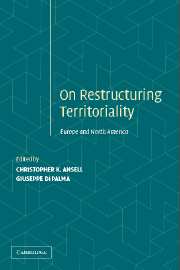Book contents
- Frontmatter
- Contents
- Contributors
- Acknowledgments
- Restructuring Territoriality
- I THEORETICAL FRAMEWORKS
- II THE TRANSFORMATION OF GOVERNANCE
- III EUROPE–U.S. COMPARISONS
- VI CONCLUDING THOUGHTS
- 11 Territoriality, Authority, and Democracy
- Postscript: What Inefficient History and Malleable Practices Say about Nation-States and Supranational Democracy When Territoriality Is No Longer Exclusive
- Reference List
- Index
11 - Territoriality, Authority, and Democracy
Published online by Cambridge University Press: 03 December 2009
- Frontmatter
- Contents
- Contributors
- Acknowledgments
- Restructuring Territoriality
- I THEORETICAL FRAMEWORKS
- II THE TRANSFORMATION OF GOVERNANCE
- III EUROPE–U.S. COMPARISONS
- VI CONCLUDING THOUGHTS
- 11 Territoriality, Authority, and Democracy
- Postscript: What Inefficient History and Malleable Practices Say about Nation-States and Supranational Democracy When Territoriality Is No Longer Exclusive
- Reference List
- Index
Summary
As described in the introduction to this book, our collective inquiry was partly prompted by John Gerald Ruggie's provocative description of the European Union (EU) as the world's first “postmodern polity” and his argument that this new state of affairs was a consequence of the “unbundling of territoriality” (Ruggie 1993). Ruggie suggested that modernity transformed the “multi-perspectival” feudal world, with its parcellized authority and overlapping jurisdictions, into the “single-point perspective” modern world with its “territorially defined, fixed, and mutual exclusive enclaves of legitimate domination.” As Ruggie puts it, “The chief characteristic of the modern system of territorial rule is the consolidation of all parcellized and personalized authority into one public realm.” The EU represents the reemergence of parcellized authority and overlapping jurisdictions in a postnational (and hence postmodern) framework.
Our group agreed (and who does not?) that territoriality – the consolidation of political authority into “territorially defined, fixed, and mutually exclusive enclaves” – is a core constitutive principle of modern political organization. Indeed, territoriality is like the air we breathe – something upon which we utterly depend and yet largely take for granted. The “unbundling of territoriality” does not simply pose a challenge to sovereignty. We are familiar with those types of challenges. A weak state may have its sovereignty violated by a strong state, and even strong states do not fully control their borders. Yet the organizing principle of territoriality remains intact. States still strive to be sovereign.
- Type
- Chapter
- Information
- Restructuring TerritorialityEurope and the United States Compared, pp. 225 - 245Publisher: Cambridge University PressPrint publication year: 2004
- 8
- Cited by



